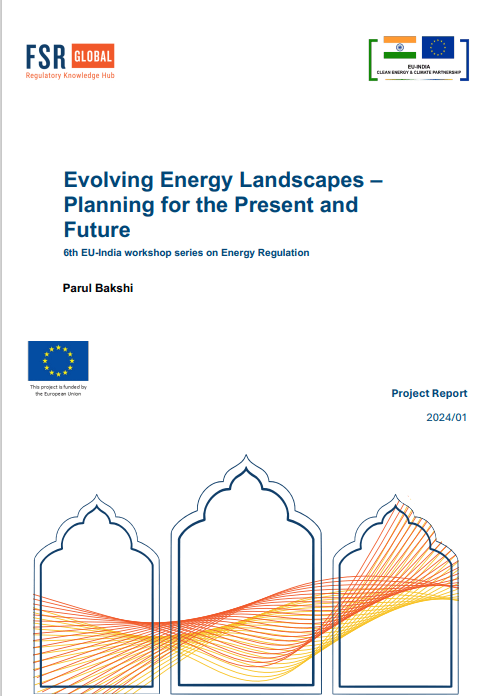Project Report
Evolving Energy Landscapes – Planning for the Present and Future
6th EU-India Workshop Series on Energy Regulation
10 May 2024
This report presents the outcomes of the 6th cycle of the ‘EU-India Energy Regulatory Workshop Series,’ which took place in 2024. The workshop series comprised three online sessions focusing on key topics relevant to both the Indian and European energy landscapes: Interoperability, Resource Adequacy, and Offshore Wind Energy.
The session on ‘Interoperability’ highlighted the importance of standards for smart appliances to enable their integration into energy markets and planning. While smart devices can connect and
interact with users and other devices, the lack of common standards hinders seamless communication. The session emphasized the need for standardization in automating appliances and managing energy usage. Additionally, it underscored the importance of data standardization
in the IoT ecosystem for effective energy management and citizen engagement.
The ‘Resource Adequacy’ session discussed the challenges and strategies for ensuring a reliable power supply in the transition to a renewable heavy power system. With India aiming to achieve 450 GW of renewable energy capacity by 2030, resource adequacy becomes crucial to maintain supply reliability amidst increasing variability from renewable sources. The session highlighted the need for a resource-adequate system to ensure sufficient generation, transmission, and
storage to serve electricity demand.
The ‘Offshore Wind Energy’ session explored the potential of offshore wind energy for both the EU and India. While the EU has been a leader in offshore wind energy, with ambitious targets for capacity expansion, India is still in the early stages of development. India’s extensive coastline offers significant potential for offshore wind farms, and the government has initiated plans to auction projects. Collaboration between the EU and India in offshore wind energy can lead to
mutual benefits, with the EU sharing its expertise and India offering learning opportunities from its growing market.
Each chapter of this report will explore the key takeaways from the webinars, providing detailed insights into the discussions and recommendations made by experts from both regions. Through these insights, the report aims to contribute to the ongoing dialogue on energy transition and regulatory frameworks in the EU and India.
All video recordings and presentations from the webinars are available in open access:
Author

